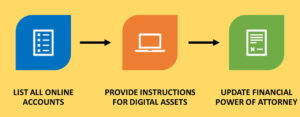
Until very recently, Pennsylvania did not have any concrete guidelines as to how your personal representative could access your digital assets (online accounts) if you were to become disabled or die.
On July 23, 2020, Governor Wolf signed Act 72 of 2020, officially called the Revised Uniform Fiduciary Access to Digital Assets Act (“Act”), that provides for the disclosure of digital assets and electronic communications to fiduciaries. The Act will take effect in January 2021.
Under the Act, your fiduciary (i.e., Executor under a Last Will and Testament, an Agent acting under Power of Attorney, a Court Appointed Guardian or Trustee) may access your online content or digital assets (i.e. online bank accounts, social media accounts, etc.). The same legal duties, including the duty of care, that are imposed on a fiduciary, apply to the management of the digital assets. The Act also provides the companies that hold your digital assets, such as FaceBook, Google, Instagram, etc. with a legal framework to follow in safely disclosing your digital assets to your fiduciary.
With the passing of this Act, it is highly recommended that you review your estate plan to ensure that not only your tangible assets are accounted for, but also that your digital assets can be properly managed under the Act by your fiduciary, and include the appropriate provisions to authorize those powers. Below are three steps to take in updating your estate plan.
3 Steps to Updating Your Estate Plan to Incorporate the Revised Uniform Fiduciary Access to Digital Assets Act Powers

1. List All Online Accounts:
Write down a list of any online accounts you may have. This list should be kept alongside your estate planning documents, especially your Last Will and Testament. Be sure to include the username, password or any other identifiers for all accounts including social media accounts, your Cloud account, and online banking accounts.
2. Provide Instructions for Digital Assets:
Provide instructions for your Fiduciary on how you would like your digital assets handled at death. For example, would you like photographs from your Facebook, Instagram or Cloud passed-on to your loved ones or would you like your social media footprint to be entirely wiped? This guidance needs to be provided to your fiduciary.
3. Update your Financial Power of Attorney:
Ensure that your Power of Attorney specifically mentions access to your digital assets. If not, your Financial Power of Attorney may need to be updated accordingly.
Pittsburgh Estates and Trusts Attorneys
The Estates and Trust Attorneys at The Lynch Law Group are happy to provide a complimentary review of your estate plan and answer any questions you may have about this new legislation to ensure your plan protects your current goals, which more than likely include your footprint of digital assets. Please contact Charles B. Hadad, Esquire at (724) 776-8000 to arrange a time to discuss your plan. We offer both in-person and virtual appointments.




